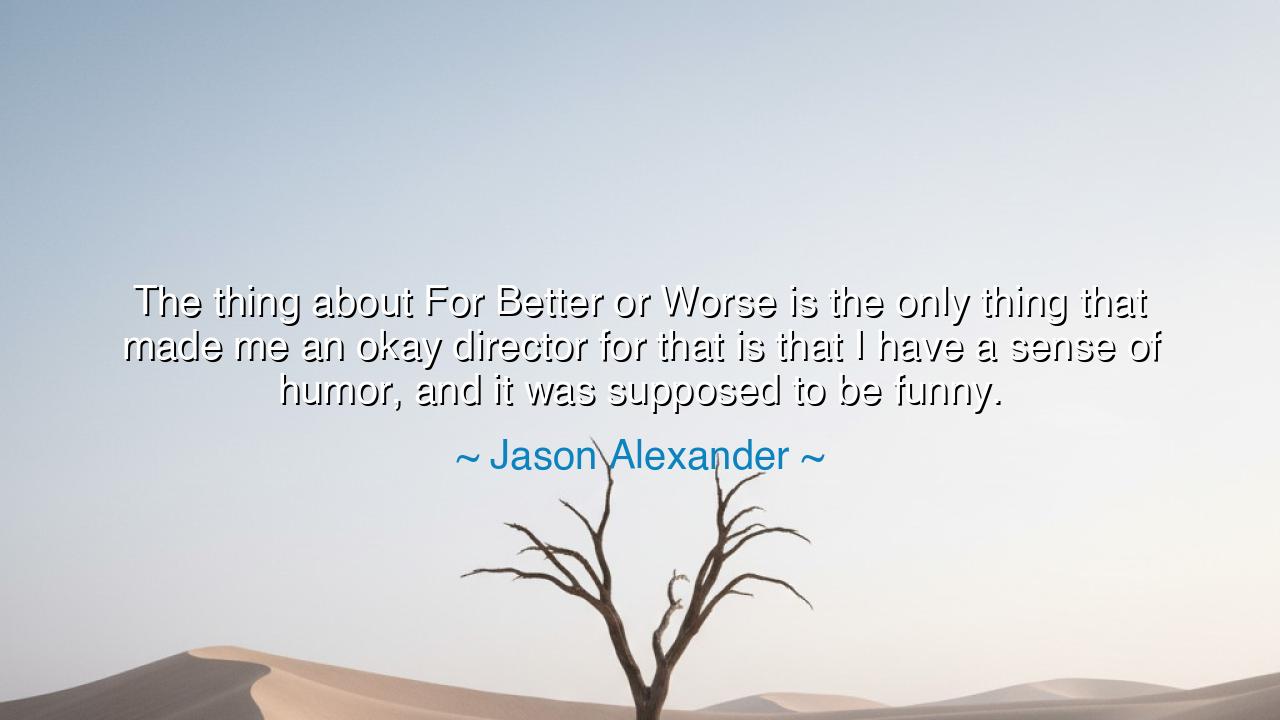
The thing about For Better or Worse is the only thing that made
The thing about For Better or Worse is the only thing that made me an okay director for that is that I have a sense of humor, and it was supposed to be funny.






The words of Jason Alexander—“The thing about For Better or Worse is the only thing that made me an okay director for that is that I have a sense of humor, and it was supposed to be funny”—speak not merely of filmmaking, but of humility, self-awareness, and the sacred bond between laughter and understanding. Beneath the lightness of his tone lies an ancient truth: that in all endeavors of creation, it is not mastery alone that makes us worthy, but the spirit we bring—the ability to see the world not with pride, but with perspective, and to approach our work with the humor of the heart. For humor is the great equalizer; it bridges imperfection and grace, failure and triumph.
In the ages past, the philosophers of Greece often spoke of the “golden mean”, that sacred balance between extremes. Aristotle, who pondered the virtues of men and the purposes of art, declared that a noble spirit must know laughter, for laughter tempers seriousness and brings wisdom down to earth. Jason Alexander’s words reflect this same balance: the awareness that though art demands devotion, it also thrives on lightness of being. His success as a director did not come from vanity or claim of greatness, but from recognizing that to tell a funny story, one must first be humble enough to laugh—both at the world and at oneself.
The origin of this wisdom comes from Alexander’s own journey through the realm of performance. Known to many for his role in Seinfeld, where humor became a vessel for human truth, he carried into his directorial work that same understanding: that comedy, at its core, is a mirror of our contradictions. In saying he was only “an okay director,” he shows the ancient virtue of modesty, reminding us that talent is not perfection, but participation in something larger than the self. His sense of humor was his guide, the compass that helped him navigate the delicate dance between chaos and creation.
To understand this truth more deeply, let us remember the tale of Molière, the great French playwright of old. His comedies mocked the hypocrisy of the powerful and the pretensions of the proud, yet they never descended into cruelty. His laughter was sharp but never hateful, and it revealed the follies of humankind with compassion. Molière’s genius lay not in his command of technique alone, but in his sense of humor that understood suffering—the same quality Alexander honors in his words. For to laugh wisely is to know pain, and to heal it with grace.
The lesson hidden within Alexander’s quote is this: to do anything well—whether to lead, to create, to love, or to live—we must carry within us a sense of humor, that divine perspective that frees the heart from fear and pride. Those who take themselves too seriously are like statues—imposing, but lifeless. Those who can laugh, even in the midst of labor, are alive with the breath of creation. The sense of humor he speaks of is not mere jest; it is spiritual resilience, a refusal to let despair or arrogance poison the work of the soul.
For when we work without laughter, we work in darkness. When we create without joy, we build monuments of pride that soon crumble. But when we approach life as Alexander did—with humor, humility, and self-knowledge—then even our smallest efforts become radiant. The artist who smiles at his imperfections becomes one with the universe’s rhythm, for he has learned what the ancients taught: that all of life is a great play, and the wise are those who act their part with grace, knowing the laughter of the gods echoes in every scene.
Therefore, let the reader learn: embrace your own imperfection with humor, for it will make you not lesser, but freer. When the world grows heavy and serious, lighten it with laughter that springs from love, not mockery. Be humble enough to say, as Alexander did, “I was only okay”—for in that humility lies greatness. Humor is not the absence of seriousness; it is the light that keeps seriousness from turning to stone.
So pass down this teaching as the elders once did: He who can laugh with wisdom shall walk through life with peace. Let your art, your work, your days be filled with the warmth of laughter—not the hollow laughter of pride, but the living laughter of truth. For in the end, to have a sense of humor is to have a sense of life itself.






AAdministratorAdministrator
Welcome, honored guests. Please leave a comment, we will respond soon